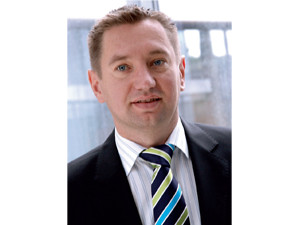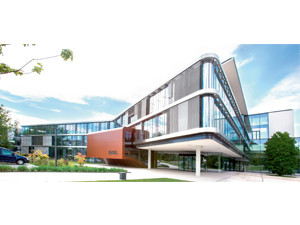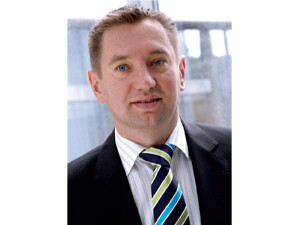Engel has bright hopes in the Middle East, where its market is set for a boost from major events – and ongoing turmoil
The Middle East’s many appealing characteristics are often outweighed its one key disadvantage – ongoing crisis. Yet for Austria’s Engel, a manufacturer of plastics processing machinery, there is an upside to supply chain disruption, explains Andreas Leitner, Sales Director Middle East, ENGEL.
“Geopolitical changes are affecting logistics in many cases,” he told Packaging MEA.
“As transport routes have been cut off, it is no longer possible to supply just-in-time deliveries from one region to another. This has brought about new plastics processing businesses and therefore new customers, especially in the smaller countries.”
Not that the company is reliant on negative developments for new business. Engel is also benefiting from the region’s economic progress and propitious demographics.
“The order situation is very good,” said Leitner of the company’s performance in 2015. “In the field of closures and packaging we expect a growth above 10% and in the fields of technical moulding and medical above 5%.”
Engel considers itself one of the global leaders in the manufacture of plastics processing machines. The group offers a full range of technology modules for plastics processing as a single source supplier: injection-moulding machines for thermoplastics and elastomers, and automation, with the assurance that individual components are also competitive and successful in the world markets.
Engel has nine production plants, in Europe, North America and Asia (China and Korea), and subsidiaries and representatives in more than 85 countries.
In the Middle East, demand is on an especially promising trajectory in Dubai and Qatar, said Leitner.
“Due to some large events taking place in the next few years such as Expo 2020 in Dubai and the 2022 football World Cup in Qatar, we are seeing exceptional growth, especially in those two countries,” he said. “For Qatar, this means the start of local production in many cases, which did not exist before. And in the United Arab Emirates, it is resulting in the continuous expansion of existing capacity in order to cope with these large events.”
Engel’s customers in Saudi Arabia have reported increases in turnover too, making the company feel “very positive about new projects in 2016”.
Leitner also underscores how sustainability is spurring the market’s expansion.
“What is particularly pleasing is the fact that sustainability is playing a very important role in all these investments,” he said. “Our product portfolio and our energy-efficient drive solutions in particular mean we are really meeting requirements very effectively here.”
In his view, Engel is positioned optimally to face the challenges in the Middle Eastern market. The regional sales team works closely with the packaging business unit at Engel’s headquarters in Austria, which bundles the experience gained from projects in the packaging industry across the globe, he added.
“Thanks to many years of experience in the industry, its outstanding expertise in system solutions, and its strong global presence, Engel is a reliable partner for all development and production processes,” said Leitner.
Installations in the GulfHe illustrates his view that Engel is “one of the most preferred plastics-processing industry partners in the Middle East” by citing installations in the UAE. “In the UAE, for example, all the well-known bottlers and bottle cap producers are using Engel e-cap injection moulding machines,” he said.
“The new Engel e-speed machine is becoming established in the region successfully too. One special highlight is a project involving the manufacture of airline cups that we completed in the UAE this year.
“On an Engel e-speed 500 with a 12-cavity mould, we achieved a cycle time of under three seconds including part removal and stacking thanks to an ultra-fast injection time of 0.12 seconds. This means the Engel e-speed is very clearly setting new standards.”
In the UAE, Engel has now supplied three manufacturing units for making airline cups, he added.
“The Engel e-speed hybrid machine, which has an electric clamping unit, was developed specifically for demanding thinwall applications with high productivity and high energy efficiency requirements. It therefore meets the requirements of airline suppliers perfectly, who are having to make their products lighter and lighter because of fuel consumption.”
Across the company’s wider portfolio, Leitner highlights various opportunities Engel aims to target.
“In the caps and closures field there is a clear trend towards all-electric machines, as energy efficiency is becoming extremely important,” he explained.
“With subsidies being reduced in Saudi Arabia, electricity is going to become considerably more expensive in the next few years. From a technology viewpoint it is above all the low melt flow rate required to achieve the specified cap characteristics that define the high demands put on the injection moulding machine.
“Thanks to its direct drive unit, the allelectric Engel e-cap injection moulding machines achieve the precision and performance needed for this applications. Beyond that, its increased ejection and clamping force help it attain very short cycle times. With cycle times of under three seconds and injection speeds of up to 460mm per second, the Engel e-cap is designed for highest output performance and has set new standards for the entire industry in process stability and efficiency.”
He also pointed to the regional appeal of the all-electric Engel e-motion injectionmoulding machine, developed to turn thin-walled containers that meet high-tech requirements into low-cost products. “Engel packaging turnkey solutions help processing companies to conserve energy and raw materials, and to integrate various process steps by incorporating techniques such as inmould labelling,” he added.
“Engel works with system partners who are also leaders in their respective fields here, including Swiss IML expert BECK automation and Otto Hofstetter, which is also Swiss and a leading producer of moulds for thin-wall applications.”
Another welcome trend from Engel’s perspective is a shift towards plastic pallets.
“Engel helps plastics processing companies to follow this trend with flexible system concepts based on our large yet compact Engel duo machines,” said Leitner.
“In the Middle East, pallets made from plastic are especially environmentally friendly compared to wooden pallets. A further advantage of plastic pallets is their low weight. Together with our system partners and raw material producers, we are able to utilise a wide technology and material spectrum to make the pallets lighter while keeping them very stable and stiff at the same time.”
Intelligent packaging Engel is meanwhile aiming to keep pace of the industry’s requirements through research and development informed by market trends.
“At the moment, the trend towards smaller packaging units, the increasing significance of packaging design as a differentiating feature, the trend towards thin-wall packaging, conserving raw materials, energy, weight and costs, and the trend towards ‘intelligent’ packaging are being focused on,” Leitner explained.
“What is intelligent packaging? I’ll give you some examples. It could be packaging with a barrier layer that extends the shelf life of food, packaging with a colour indicator that tells the customer how fresh the product is or a container with a lid that has a spoon made and attached during the injection moulding process.”
But against its rivals in the Gulf, Engel’s competitive advantage hinges heavily also on its relationships with customers, according to Leitner.
“Engel’s real strengths here are its customer proximity and consulting,” he said. “The more complex an application, the more important it is that we work very closely with the customer from very early on in the project – and not everything can be discussed by phone or e-mail. Engel has strengthened its sales and service teams in every region of the earth in the last few years and can be at customer premises quickly, regardless of where they are in the world.”
For Leitner, this approach is not followed by “many suppliers, Asian competitors especially” in “either sales advice or servicing”.
“To us, servicing not only includes the classic areas like maintenance and troubleshooting, but also continuous process optimisation using optimisation tools, retrofitting, and also advice when a manufacturing cell has to be adapted to new requirements,” he said.
“Engel sees itself as an important partner to its customers for the entire service life of their injection moulding machines, robots, and system solutions.
Leitner further points to the role of Engel’s “partner network” in keeping ahead of competitors.



